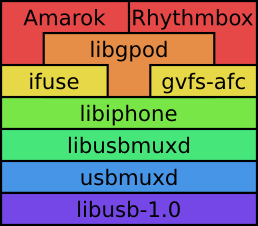Those who watch my git repos may have noticed that I’ve been working on this for a while now. iPhones and iPod Touches have never been properly supported under Linux (especially non-jailbroken devices) because they are just so different from all the previous iPod models. There was a lot of new code to write and Apple hasn’t exactly made it easy either:
- The iPhone uses a custom USB communications protocol, connection-oriented, which is totally different from standard mass storage devices
- It provides multiple services over this protocol, and many have to be interacted with to complete sync
- iPhone OS 2.x brought us a new hash (designed to lock users into iTunes) that so far had not been reverse engineered
- iPhone OS 3.x brought us a new SQLite-based database format which, although a lot more Linux-friendly than the old proprietary format, does require a bunch of new code (and the old format still needs to be supported for compatibility).
Well, I’m happy to say that all of this is coming to an end and that Linux will finally get quite complete iPhone/iPod Touch syncing support soon, thanks to the work of many dedicated people. This is what the software stack looks like:

iPhone support on Linux
- libusb-1.0 provides an advanced API to access USB devices under Linux, replacing the old libusb-0.1 API
- usbmuxd coordinates application access to the device and talks the specific iPhone/iTouch USB protocol
- libiphone implements the Apple-specific protocols that are tunneled through usbmuxd: it can launch services through lockdown, retrieve device info, send notifications, and access the filesystem via AFC.
- iFuse and gvfs-backend-afc both provide access to AFC to regular Linux apps. iFuse does this by mounting via FUSE, while gvfs-backend-afc is obviously a backend for gVFS.
- libgpod (the library that traditionally has managed music databases for iPods) is being extended to support the new SQLite format, the new hash, and also to talk to libiphone to properly put the device in to and out of sync mode.
- Theoretically, actual music players such as Amarok and Rhythmbox will need none or very few modifications to work.
I originally started work on usbmuxd which I am maintaining, and I’m now helping libgpod compatibility with the new formats. The software stack needs to be working from the bottom up, so I’ve just tagged and released the first Release Candidate for usbmuxd-1.0.0. If you have an iPhone or an iPod Touch and you’d like to use them with Linux in the future, I encourage you to test it out. If your device is jailbroken, you get the immediate benefit of being able to SSH over USB (which is a lot faster than over WiFi!), and if you’re using firmware 2.x or earlier and the hacky sync-over-WiFi-with-sshfs method, you can immediately get a speed boost by doing it over USB. If you’re feeling adventurous, the development versions of libiphone and iFuse are also quite good. Theoretically, if your usbmuxd is working an you’ve got iFuse installed, you can just type “ifuse
